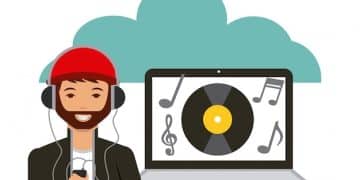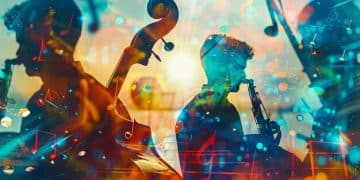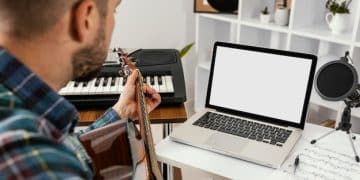New US Copyright Law 2025: Protect Your Music & Income
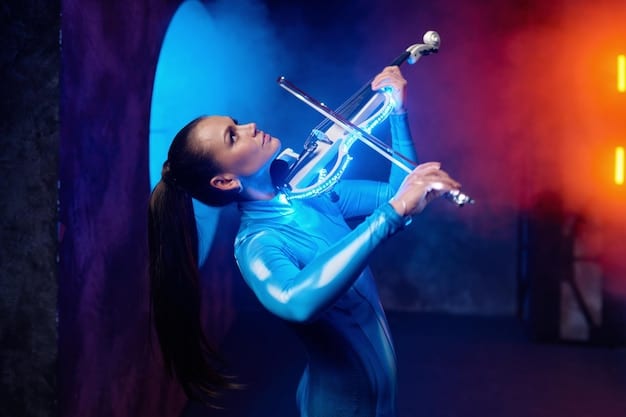
Advertisements
The evolving landscape of copyright law in the US is set to significantly impact musicians in 2025; understanding these changes and taking proactive steps to protect your music is crucial for safeguarding your creative work and ensuring fair compensation.
The world of music is constantly changing, and so are the laws that protect it. As we look ahead to 2025, a **new US Copyright Law impacts musicians**, presenting both challenges and opportunities. Understanding these changes is vital for protecting your creative work and securing your income.
Navigating the New Copyright Landscape for Musicians
Copyright law is the backbone of protection for musicians. It grants exclusive rights to creators for their original works, including the right to reproduce, distribute, perform, and display their music. Understanding how these rights are evolving is key to success in the music industry.
Key Changes in the 2025 Copyright Law
The upcoming changes to US copyright law aim to address challenges posed by digital platforms and AI-generated music. These adjustments will affect how musicians register copyrights, enforce their rights, and navigate licensing agreements.
Impact on Digital Music Distribution
With the rise of streaming services and online music platforms, digital distribution has become a primary source of income for many musicians. The new law seeks to modernize how royalties are collected and distributed in the digital age.
- Enhanced protection for online music licensing.
- Updated rules for fair use and sampling in digital mediums.
- Streamlined processes for royalty collection and distribution.
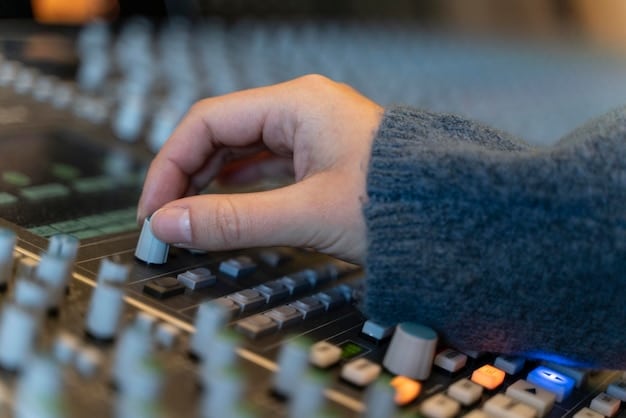
In conclusion, the evolving copyright laws in the US are designed to protect musicians in the digital era. Staying informed and proactive is essential for navigating this changing landscape and safeguarding your creative work.
Registering Your Music: A Step-by-Step Guide
Registering your music with the US Copyright Office is a crucial step in protecting your intellectual property. This process formally establishes your claim to ownership, making it easier to enforce your rights if infringement occurs.
Preparing Your Copyright Application
Before you begin the registration process, gather all necessary information about your work, including the title, author, and publication date. Ensure you have a clear copy of your music in a suitable format for submission.
Submitting Your Application Online
The US Copyright Office offers an online registration system that allows you to submit your application and upload your music electronically. This method is generally faster and more efficient than submitting a paper application.
- Create an account on the US Copyright Office website.
- Complete the online application form accurately.
- Upload a digital copy of your music.
- Pay the required registration fee.
Registering your music ensures you have legal recourse in case of copyright infringement. This proactive step is essential for protecting your creative work and financial interests as a musician.
Understanding Music Licensing and Royalties
Music licensing is the process of obtaining permission to use copyrighted music in various contexts, such as films, TV shows, commercials, and streaming services. Understanding how licensing works is vital for generating income from your music.
Types of Music Licenses
There are several types of music licenses, each covering different uses of your music. These include synchronization licenses, mechanical licenses, performance licenses, and master use licenses.
Collecting Royalties for Your Music
Royalties are payments made to copyright holders for the use of their music. These payments can come from various sources, including streaming services, radio airplay, and public performances.
- Affiliate with a Performing Rights Organization (PRO) like ASCAP, BMI, or SESAC.
- Register your songs with your PRO to track performances and collect royalties.
- Monitor your royalty statements to ensure accurate payments.
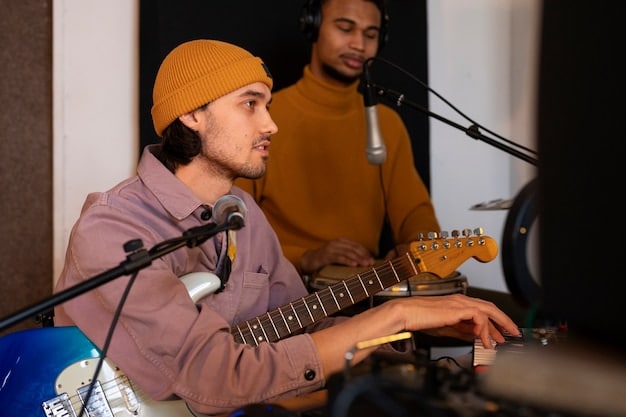
Understanding music licensing and royalties is a key component of generating income as a musician. By actively managing your rights and affiliations, you can ensure you receive fair compensation for your work.
Protecting Your Music from Copyright Infringement
Copyright infringement occurs when someone uses your music without permission, violating your exclusive rights as the copyright holder. Detecting and addressing infringement is an essential part of protecting your creative work.
Monitoring for Unauthorized Use
Regularly monitor online platforms, streaming services, and social media for unauthorized use of your music. Use tools like Google Alerts and YouTube’s Content ID to track potential infringement.
Taking Action Against Infringement
If you discover copyright infringement, take prompt action to protect your rights. This may involve sending a cease-and-desist letter, filing a DMCA takedown notice, or pursuing legal action.
- Document all instances of infringement with screenshots and timestamps.
- Consult with an attorney specializing in copyright law.
- Consider using a copyright enforcement service to automate the monitoring process.
Protecting your music from copyright infringement is a crucial aspect of safeguarding your creative work. By actively monitoring and taking action against unauthorized use, you can preserve your rights and income.
The Role of AI in Music and Copyright
Artificial intelligence (AI) is increasingly playing a role in music creation, raising new questions about copyright ownership and protection. Understanding the implications of AI-generated music is vital for musicians.
Copyright Implications of AI-Generated Music
The copyright status of AI-generated music is still evolving. Currently, US copyright law generally requires human authorship for copyright protection. However, the extent of human involvement needed is a subject of ongoing debate.
Protecting Your Originality in the Age of AI
Musicians can protect their originality by documenting their creative process and asserting their human authorship. Clearly demonstrating your unique contribution can help establish your copyright claim.
- Maintain records of your creative input and decision-making.
- Collaborate with legal experts to understand the evolving legal landscape.
- Consider using watermarks or other identifiers to mark your work.
As AI continues to evolve, musicians must stay informed and proactive in protecting their rights. Understanding the copyright implications of AI-generated music will be crucial for navigating the future of the music industry.
Navigating Legal Challenges and Disputes
Legal challenges and disputes can arise even with careful copyright management. Knowing how to navigate these issues effectively is essential for protecting your rights and resolving conflicts.
Seeking Legal Counsel
Consulting with an attorney specializing in copyright law is crucial for navigating complex legal issues. An experienced attorney can provide guidance on your rights, options, and potential legal strategies.
Mediation and Arbitration
Mediation and arbitration are alternative dispute resolution methods that can help resolve copyright disputes without going to court. These processes involve a neutral third party who facilitates negotiations or makes a binding decision.
- Thoroughly document all communications and agreements.
- Explore alternative dispute resolution methods to save time and resources.
- Maintain open communication with legal counsel throughout the process.
Effectively navigating legal challenges and disputes requires careful planning and expert guidance. By seeking legal counsel and exploring alternative dispute resolution methods, musicians can protect their rights and resolve conflicts efficiently.
| Key Point | Brief Description |
|---|---|
| 📝 Registration | Register your music with the US Copyright Office to protect your intellectual property. |
| 💰 Licensing | Understand the different types of music licenses and how to collect royalties. |
| 🛡️ Infringement | Monitor for unauthorized use of your music and take action against infringement. |
| 🤖 AI | Stay informed about the copyright implications of AI-generated music. |
FAQ
▼
Copyright registration provides legal protection for your music, making it easier to enforce your rights and claim damages in case of infringement. It establishes a public record of your ownership.
▼
To license your music for film or TV, you typically need to grant a synchronization license. Contact music supervisors or licensing agencies to promote your music for potential placements.
▼
PROs like ASCAP, BMI, and SESAC collect performance royalties for songwriters and publishers when their music is played publicly. Joining a PRO ensures you get paid for the public performance of your work.
▼
If you discover copyright infringement, document it, and consult with a copyright attorney. You may need to send a cease-and-desist letter or file a DMCA takedown notice to protect your rights.
▼
AI raises complex copyright issues, particularly regarding authorship. Human involvement is generally required for copyright protection. The legal landscape is evolving, so stay informed and consult experts.
Conclusion
As the **new US Copyright Law** evolves, musicians must stay informed and proactive in protecting their music and income. By understanding the changes, registering their work, and actively managing their rights, musicians can navigate the complexities of the industry and secure their creative future.
